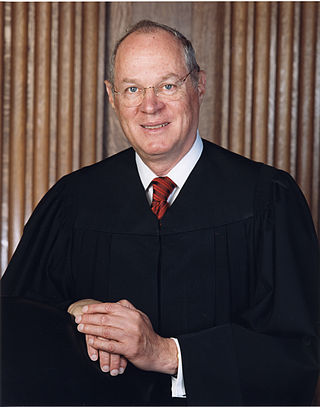
The Supreme Court of the United States (SCOTUS) is the highest court in the federal judiciary of the United States. It has ultimate appellate jurisdiction over all U.S. federal court cases, and over state court cases that turn on questions of U.S. constitutional or federal law. It also has original jurisdiction over a narrow range of cases, specifically "all Cases affecting Ambassadors, other public Ministers and Consuls, and those in which a State shall be Party." The court holds the power of judicial review: the ability to invalidate a statute for violating a provision of the Constitution. It is also able to strike down presidential directives for violating either the Constitution or statutory law.
This page serves as an index of lists of United States Supreme Court cases. The United States Supreme Court is the highest federal court of the United States.

Anthony McLeod Kennedy is an American attorney and jurist who served as an associate justice of the Supreme Court of the United States from 1988 until his retirement in 2018. He was nominated to the court in 1987 by President Ronald Reagan, and sworn in on February 18, 1988. After the retirement of Sandra Day O'Connor in 2006, he was considered the swing vote on many of the Roberts Court's 5–4 decisions.

The 2009 term of the Supreme Court of the United States began October 5, 2009, and concluded October 3, 2010. The table illustrates which opinion was filed by each justice in each case and which justices joined each opinion.

The 2010 term of the Supreme Court of the United States began October 4, 2010, and concluded October 1, 2011. The table illustrates which opinion was filed by each justice in each case and which justices joined each opinion.
Wal-Mart v. Dukes, 564 U.S. 338 (2011), was a United States Supreme Court case in which the Court ruled that a group of roughly 1.5 million women could not be certified as a valid class of plaintiffs in a class-action lawsuit for employment discrimination against Walmart. Lead plaintiff Betty Dukes, a Walmart employee, and others alleged gender discrimination in pay and promotion policies and practices in Walmart stores.
United States v. Jones, 565 U.S. 400 (2012), was a landmark United States Supreme Court case in which the court held that installing a Global Positioning System (GPS) tracking device on a vehicle and using the device to monitor the vehicle's movements constitutes a search under the Fourth Amendment.

The 2011 term of the Supreme Court of the United States began October 3, 2011, and concluded September 30, 2012. The table illustrates which opinion was filed by each justice in each case and which justices joined each opinion.

The 2012 term of the Supreme Court of the United States began October 1, 2012, and concluded October 6, 2013. The table illustrates which opinion was filed by each justice in each case and which justices joined each opinion.

The 2017 term of the Supreme Court of the United States began October 2, 2017, and concluded September 30, 2018. The table below illustrates which opinion was filed by each justice in each case and which justices joined each opinion.


